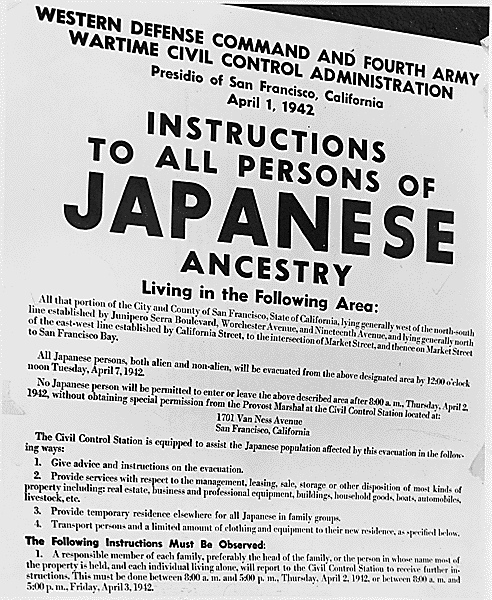As a Californian and Japanese-American (fourth-generation in both cases), I'm very proud that my state now officially recognizes today as Fred Korematsu Day. I realize that some may see the proliferation of specially-designated days like this as political correctness run amok, but unfortunately, it's clearly necessary - it's appalling how often I encounter people who know nothing about the Japanese-American internment. It's particularly scary given the current political climate where it seems like many in Washington believe "national security" should trump civil liberties.
Brief History Lesson
For those who don't know what I'm talking about, between 1941 and 1945, after the bombing of Pearl harbor, the United States government forcibly removed over 120,000 persons of Japanese ancestry from their homes on the Pacific coast and placed the majority in 10 "camps" in the western interior of the country (I put "camps" in quotes because although they were euphemistically referred to as internment camps, I really think "prison" is the the proper word for an institution surrounded by barbed wire where you are shot if you try to leave). Over two-thirds of the prisoners were American citizens, including my grandparents. Although the Japanese community was rounded up in the name of 'national security', not a single person of Japanese ancestry was ever convicted of spying or treason, and ironically, Japanese American men were later allowed to join the army (to fight in Europe) and their unit, the 100th Battalian/442nd Regimental Combat Team, became one of the most decorated units in history. Fred Korematsu was a Californian who refused to obey the order to report to the assembly centers; similarly, in Washington and Oregon, Gordon Hirabayashi and Minoru Yasui defied the curfew imposed on Japanese individuals. All three cases went to the Supreme Court, where they lost at the time, but those convictions were finally overturned in the 1980s.
If you are not familiar with this chapter of U.S. history, the National Asian American Telecommunications Association has a great site, Exploring the Japanese American Internment through Film and the Internet, and there's also a cool Digital History site. Personally, I learned a lot about the internment when I was younger by reading the personal stories of internees, such as Desert Exile: The Uprooting of a Japanese-American Family, and Nisei Daughter.
Brief History Lesson
For those who don't know what I'm talking about, between 1941 and 1945, after the bombing of Pearl harbor, the United States government forcibly removed over 120,000 persons of Japanese ancestry from their homes on the Pacific coast and placed the majority in 10 "camps" in the western interior of the country (I put "camps" in quotes because although they were euphemistically referred to as internment camps, I really think "prison" is the the proper word for an institution surrounded by barbed wire where you are shot if you try to leave). Over two-thirds of the prisoners were American citizens, including my grandparents. Although the Japanese community was rounded up in the name of 'national security', not a single person of Japanese ancestry was ever convicted of spying or treason, and ironically, Japanese American men were later allowed to join the army (to fight in Europe) and their unit, the 100th Battalian/442nd Regimental Combat Team, became one of the most decorated units in history. Fred Korematsu was a Californian who refused to obey the order to report to the assembly centers; similarly, in Washington and Oregon, Gordon Hirabayashi and Minoru Yasui defied the curfew imposed on Japanese individuals. All three cases went to the Supreme Court, where they lost at the time, but those convictions were finally overturned in the 1980s.
If you are not familiar with this chapter of U.S. history, the National Asian American Telecommunications Association has a great site, Exploring the Japanese American Internment through Film and the Internet, and there's also a cool Digital History site. Personally, I learned a lot about the internment when I was younger by reading the personal stories of internees, such as Desert Exile: The Uprooting of a Japanese-American Family, and Nisei Daughter.

Comments
Post a Comment
Comments that contribute to the discussion are always welcome! Please note that spammy comments whose only purpose seems to be to direct traffic to a commercial site will be deleted.